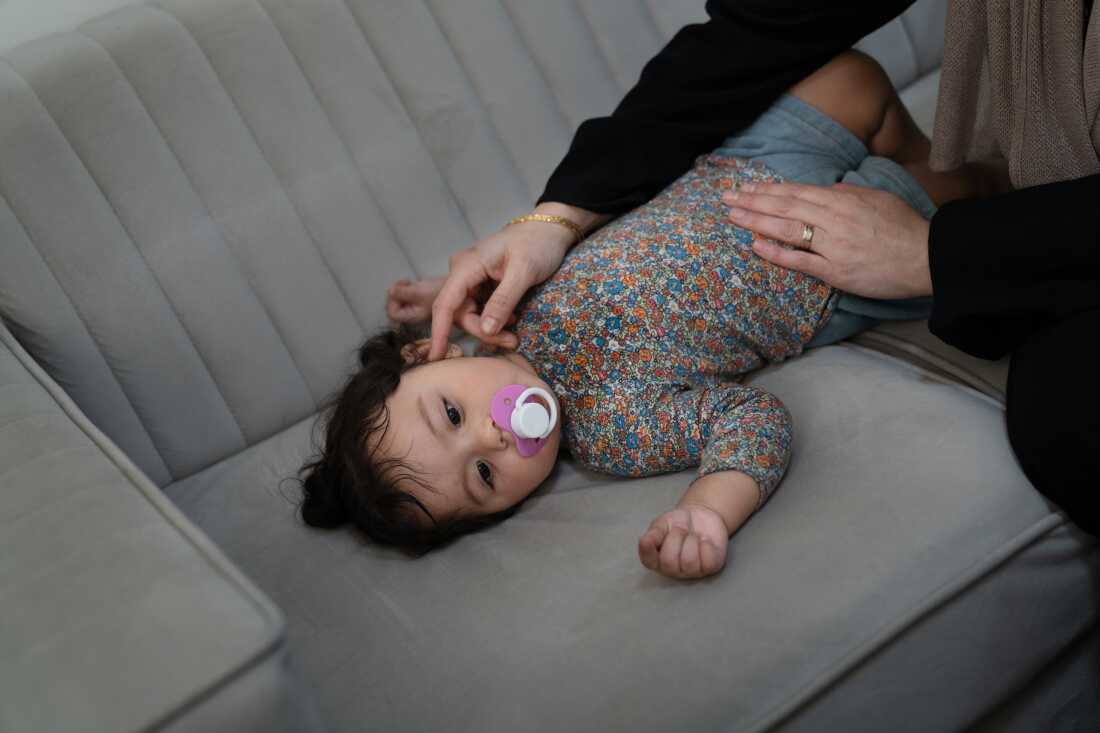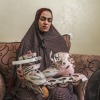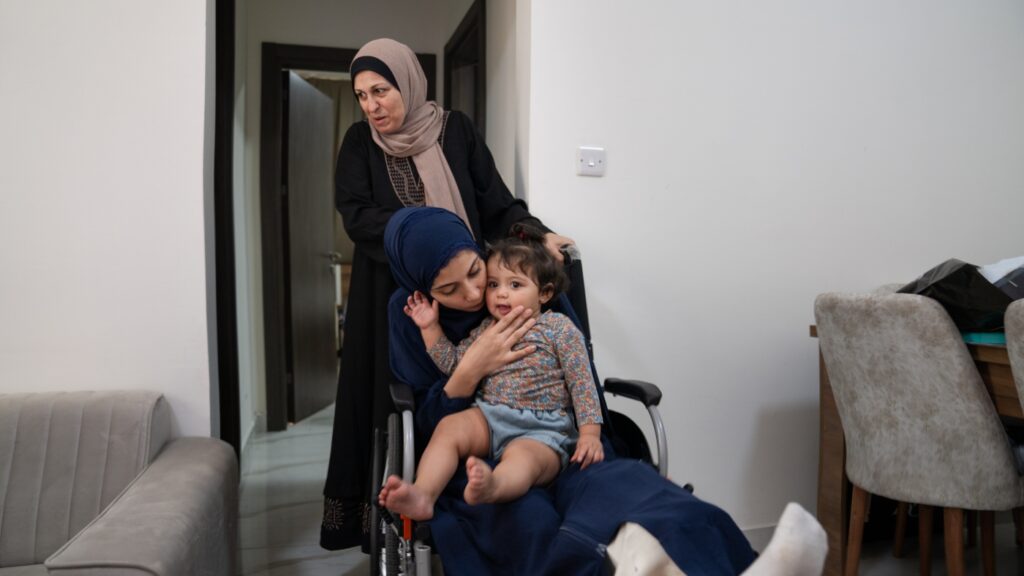
Raneem Hijazi holds her baby, Mariam, on her lap in her wheelchair, as Hijazi’s mother-in-law, Soha Sakallah (standing), helps her.
Claire Harbage/NPR
hide caption
toggle caption
Claire Harbage/NPR
DOHA, Qatar — Sitting in the living room chair, Raneem Hijazi feels her anxiety rise. She is waiting to meet her 11-month-old daughter for the first time since the hospital in Gaza where she gave birth.
Then the door to her apartment in Doha opens, and her mother-in-law carries baby Mariam, with her curly hair in pigtails, to her.
Hijazi, 23, is wheelchair-bound now — her legs still full of pins and braces. She holds baby Mariam on her lap and the child leans against her mother’s left shoulder, where her arm has been amputated.
Hijazi kisses her face, says her name, and “It’s me, your mom.” But it’s clear, Mariam doesn’t recognize her. The baby reaches for her grandmother.
This bittersweet moment is one Hijazi thought might never happen. After all, it’s taken more than 300 days. But it’s a moment she has thought a lot about, one that kept her going in the darkest times, through more than a dozen surgeries and excruciating physical and emotional pain.
In that moment of reuniting, all of Hijazi’s doubts disappeared. She thought, “This is my daughter. How did I leave her behind?”

The night of Mariam’s birth

Mariam’s birth was a miracle. Hijazi was eight months pregnant when the Hamas-led Oct. 7, 2023, attack on Israel happened, and the Israeli airstrikes started in Gaza City, where she lived with her husband, his family, and their 11-month-old son, Azuz.
The bombings sent Hijazi and her extended family to seek shelter in central Gaza, where the Israeli military said it was a “safe zone.” It was there, at 3 a.m., that an airstrike hit their accommodation.
Hijazi’s mother-in-law, Soha Sakallah, saw Hijazi, her arms and legs trapped and mangled. “Her leg — I could see the bones, the flesh. It was dark. I didn’t know what to do,” Sakallah remembers, crying. Nearby, she saw a gruesome scene: Hijazi’s son Azuz, Soha’s grandson, wasn’t moving. “I was saying, Azuz, Azuz. I held him, and I saw that his head was gone.”

Mariam waits and plays with her grandmother during her mother’s physical therapy appointment.
Claire Harbage/NPR
hide caption
toggle caption
Claire Harbage/NPR
Baby Azuz was killed that day, along with seven other family members. Hijazi, who was badly injured and buried in rubble, told her husband Asaad Sakallah, who survived, “Leave me. Leave me to die. My son is dead.”

But they didn’t leave her. Hijazi made it to Nasser Hospital in Khan Younis, in the southern Gaza Strip, where thousands of people lined the hallways, seeking safety from the ongoing airstrikes. There, the doctors performed an emergency cesarean section, lit only by the flashlights on their mobile phones. There was no electricity, no water, and no antibiotics to fight infections. And yet she delivered a healthy baby girl, several weeks early.
She named her Mariam, after her husband’s sister who was killed.
“The minute they got Mariam out and she was born and she drew her first breath, I drew a breath as well,” remembers Hijazi. “I came back to life.”
Airlifted to Qatar
But that life was still tenuous. After giving birth to Mariam, Hijazi’s wounds were so severe she was evacuated first to Egypt and then by the Qatari government to Doha, Qatar, where about 2,000 critically wounded patients from Gaza live, undergoing medical care.
But she was more than 1,000 miles away from her family.
Baby Mariam, along with Hijazi’s husband and his parents, were eventually able to make it to Egypt. They paid thousands of dollars to flee Gaza, but didn’t have visas to join Hijazi in Doha. So for 10 months, Hijazi, who was deep in the grief of losing her son, had to watch from her hospital bed as her second baby grew up over video messages and calls.

Soha Sakallah plays with her granddaughter, Mariam, at an apartment complex for refugees from Gaza in Doha, Qatar, in September soon after they arrived to the country from Egypt.
Claire Harbage/NPR
hide caption
toggle caption
Claire Harbage/NPR
“Every day she would do something new,” Hijazi recalls. “A little thing. A new action.” She smiled for the first time. She started talking. She got teeth.

“At first she was so tiny, she wouldn’t be able to properly focus on the phone when we would talk on video call,” she adds. “But then when she grew a bit older, I bought a toy for her, so she would focus on the phone screen and look at the camera. And then I felt I could talk to her.”
Being alone in Doha was the hardest part. Over those lonely months, Hijazi underwent more than a dozen surgeries, and countless hours of mental and physical therapy — that’s still ongoing.
“When I first got to Doha, I was in a dark place,” she remembers. “I used to think about things a lot, I got depressed. In the beginning, I wasn’t sleeping at all. I told the doctor I was having nightmares of the night we were hit by the airstrike. I kept reliving that day — the day we were hit — over and over again, unable to forget it.“
In that grief, the only thing that kept her going was the hope of one day meeting, and holding, her second baby for the first time.

Soha Sakallah tries to coax her granddaughter, Mariam, to sleep on the sofa.
Claire Harbage/NPR
hide caption
toggle caption
Claire Harbage/NPR
“Talking to my daughter would make me feel so much better,” Hijazi says. “A 360 degree difference, I felt relief. She would completely turn my mood around.”
And then, on one of the last days of August, when Mariam was already crawling and talking, her family was approved to join her in Doha.
By September, Hijazi’s small two-bedroom apartment is packed: There is a bubbly baby plus Hijazi’s husband and his parents, Soha and Ezzat Sakallah who have helped raise Mariam.
Much of the time, all the adults are focused on baby Mariam, who is now the center of attention. “She’s the fruit of this house,” her grandfather Ezzat says, “the joy of this house.”
Hijazi says her daughter’s presence has lifted her spirits and helped her focus on rebuilding her physical strength.
A long road to recovery
Many of the services Hijazi and other wounded patients from Gaza need are housed in the same complex in Doha where they live: apartments built as housing for soccer’s 2022 FIFA World Cup. In one of her afternoon physical therapy sessions, Hijazi’s therapist lifts her leg with a weight strapped to her ankle.
“We’re doing this to strengthen the muscles,” says Ruwaa Majed, her physiotherapist. “Hold it for 10 seconds, and release.” She counts to 10, as Hijazi protests. “I’m done Ruwaa, I already did 10!” she says, laughing. “You’re counting too slowly.”
These two women are around the same age, and over the months they’ve been working together they’ve become close friends. Some sessions, they just sit and talk. By this point, Majed knows Hijazi often needs a little push to keep going.
“Come on Raneem,” she encourages now, “Don’t you wanna be able to run after your daughter?”
But nearly a year after the attack, even the smallest movements still cause excruciating pain. Hijazi needs a prosthetic arm and will require at least another year of extensive therapy to be able to walk and care for Mariam. She’s scheduled for another major surgery in the coming weeks to try and reconstruct the kneecap on her left leg, which was crushed.

Raneem Hijazi was injured when the apartment in Gaza where she was sheltering was bombed. She’s working on building strength in her legs, though she will still need more surgeries before she can heal.
Claire Harbage/NPR
hide caption
toggle caption
Claire Harbage/NPR
“Sometimes I sit there and I think, I’ve only got one arm, both my legs are injured. My health isn’t very good. … How can I get up and do things? People who are in my situation don’t do things,” she says. “But then I hear stories about women who have lost both their arms and legs and are still doing things and I think, why not me?“
She recently watched a video online of a woman who does everything with her feet — eating and drinking, and she felt inspired.
“I don’t want to just sit there and do nothing, so I’m trying to learn to do things with my injuries. I’m trying to cook,” she says. “I think to myself: I still have one arm, at least. Let me use it.”

Back in her apartment, Hijazi winces as she walks gingerly down the hallway to the kitchen, bracing herself against the wall. She begins to make coffee, using her teeth to open a water bottle and untie a plastic bag of spices.
“I never want people to do things for me,” she says, “I want to do things for myself.”
Spending time in the kitchen brings her comfort. Before the war, she loved to bake. “Here is a chocolate cheesecake I made,” she says, bringing up a photo on her phone. She scrolls back through time, pulling up more cakes and chocolates she’s crafted. “Made by Raneem!” she says, laughing.
Despite having a long road ahead, moments like these remind her of the parts of herself, and her old life in Gaza, that she is working to regain.
Scrolling through cake photos, she tries not to linger on the hundreds of photos of Azuz. It’s impossible to remember her life in Gaza without feeling the ache of losing her son, she says. Mariam is now about the same age Azuz was when he was killed, and both she and her husband can’t help but see him in her.

Raneem Hijazi (left) holds her baby, Mariam, while sitting next to her husband, Asaad Sakallah, at an outdoor cafe in Doha, Qatar. Until this summer, Hijazi was in Qatar by herself getting treatment. Now having the whole family around has livened up her life.
Claire Harbage/NPR
hide caption
toggle caption
Claire Harbage/NPR
“She looks just like her brother,” Asaad Sakallah, 25, says.
“If my daughter does something that reminds me of my son, I find myself immediately going to look back through photos of him, and remembering him, and I start to cry,” says Hijazi. “Her eyes are like his. Her laugh is like his. Even when I hold her, my heart hurts for her and for my son.”
Sakallah pulls up a video of Azuz, laughing. He then scrolls to a different video, taken just days ago, of Mariam laughing.
It sounds exactly the same.
Mariam doesn’t know her mom yet, and Hijazi’s injuries make it difficult to hold her, to feed her and to change her. In her wheelchair, Hijazi cradles Mariam with her one arm and Mariam struggles to get away.
“As you can see, she’s not used to me. Her grandma is like her mother,” she explains. “That feeling alone kills me.”
Hijazi has resorted to little tricks to keep Mariam close. On the couch one morning she tickles the little girl, feeding her small kernels of popcorn to keep her from crawling away. “I’m tempting her with popcorn,” she says. “I hope that she gets attached to me and gets used to me. The feeling of motherhood is so special.”
With every bite Mariam giggles, and Hijazi smiles. “Bit by bit it’s getting better,” Hijazi says. “She’s getting to know me and feel more comfortable around me.”
Beginning to think about the future
For much of the time Hijazi has been in Doha, she hasn’t let herself think about the future.
“We are just living each day as it comes here, we don’t know what’s going to happen tomorrow,” she says. “I think about how we will build a life for Mariam. Our life isn’t settled here. Where will we be in a year’s time?”
But having her family join her these last few days has eased some of her anxieties. She’s taken on the role of tour guide, directing them to ice cream at the port and to the Souq Waqif, a market in the center of the city.
One night Sakallah pushes her wheelchair through the section of the market selling loud colorful birds. Mariam is riding on her lap, holding onto a big pink balloon and squealing with excitement.

Raneem Hijazi walks a few steps with help from her husband, Asaad Sakallah, to see the skyline of Doha from the port. They take some photos in the city and later get ice cream, building new memories together in this new life.
Claire Harbage/NPR
hide caption
toggle caption
Claire Harbage/NPR
There are no airstrikes here; no damaged buildings. They are safe. But the market reminds Hijazi of markets back in Gaza, and she lingers on the fact this is not their home.
But Mariam’s unfiltered delight is contagious, and at this moment Hijazi feels at ease, and hopeful.
“I tell myself we are only living this life once, and it’s fleeting,” Hijazi says. In these moments, it’s hard not to try and see the world through Mariam’s eyes. “I would be happy giving Mariam even half the life we used to have in Gaza.”
This story was supported by the Pulitzer Center on Crisis Reporting.
This story was reported by Elissa Nadworny; produced by Fatima Al-Kassab; photos by Claire Harbage; mixed for radio by Lauren Migaki; edited for radio by James Hider and Steve Drummond; edited for digital by Alex Leff.



